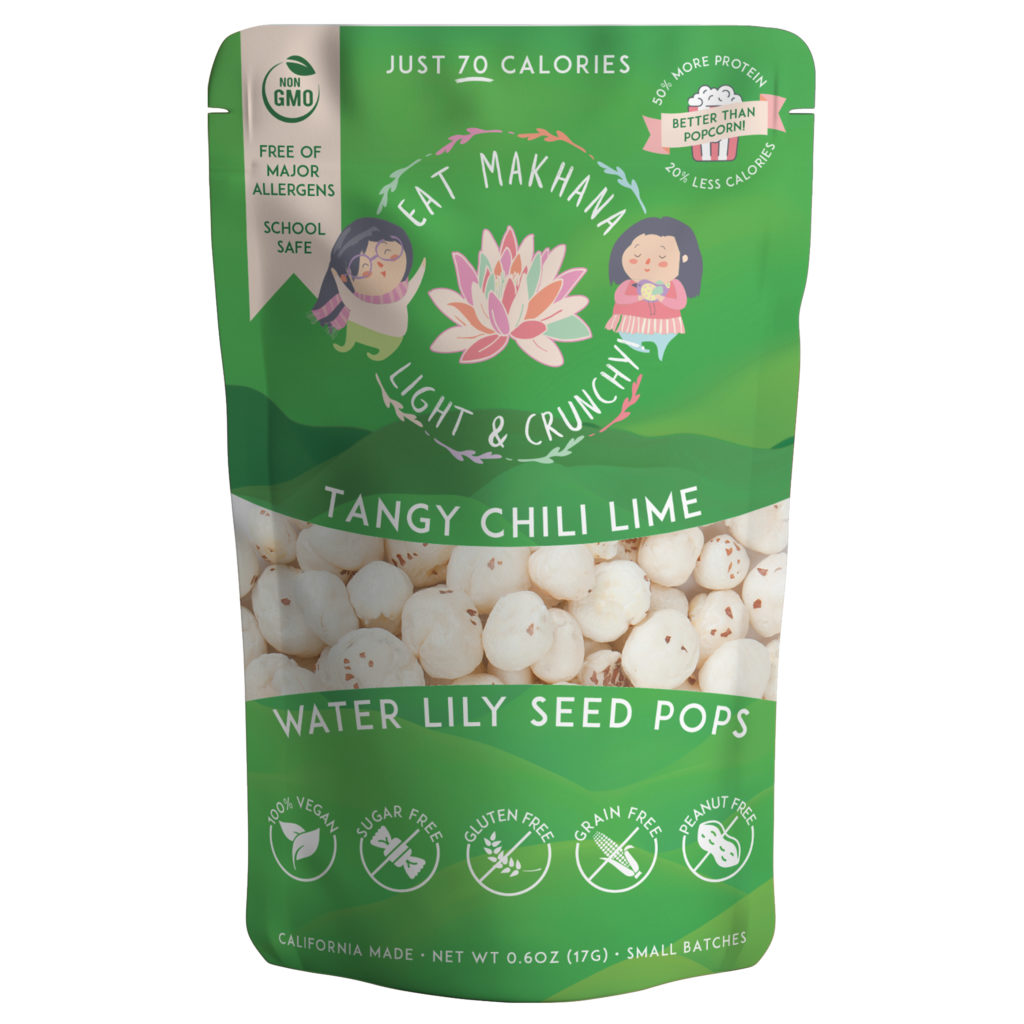A Global Statistician’s Love for Lily Seeds Turns Entrepreneurial!
For Mallika Chawla, entrepreneurship was not something that came by nature. She was a trained economist and statistician obtaining her master’s degree from the University of Cambridge, which she followed up by working in a high-profiled role at Goldman Sachs in Singapore. However, her tryst with entrepreneurship began when she moved to Silicon Valley, the land of entrepreneurial dreams. Her move from Singapore to the Bay was due to her relationship with her then boyfriend, who is now her husband, as she proclaims in an interview.
She says, “Food in America, especially snacks, have many corn byproducts, which was making me feel unwell. I went back to the Makhana (Lily seeds) of my childhood that my mother made for me. It was one of the few foods I had growing up that was anti-inflammatory, low in fats and calories, but also delicious in taste. We started making it at home, and soon everyone wanted a pop!”


Her love for the Indian originated snack led her to start the company called Eat Makhana in early 2018. She met her ideal co-founders Amruta Gadgil and Vineet Sinha, who drove the company to new heights along with her.
Amruta recounts, “Stanford dining was our first major account, they let us demo there, and honestly we weren’t sure how we’d do. They gave us a two hour slot, but we sold everything in the first hour, so we spent the rest of our time ironing out the details of how we’d sell there. After Stanford, many other stores in the San Francisco Bay Area took notice and started stocking us.”
As the organisation was growing, it was Vineet, who had prior experience working with startups and producing his own film that was acquired by Netflix in a Reliance distribution deal, that gave further boost to the Eat Makhana venture.
He says, “I was producing a TV show at the time for Tim Draper, which brought founders in front of venture capitalists and let viewers invest in them. I advised Mallika and Amruta to come on board. After the season ended, I joined the company to help them grow the brand.”
Mallika recounts that Vineet was one of her first few friends in America and his advisory role turned into that of a co-founder as time progressed.
The Growth of Eat Makhana & Berkeley-Haas
While Eat Makhana was growing, Mallika also worked to expand her vision on business and entrepreneurship by enrolling in the prestigious full-time MBA program at the Haas School of Business at the University of California, Berkeley. Remembering her experience, she exclaims, “As a statistician and economist by training, topping that with real business skills from Berkeley-Haas and the incredible support from business leaders like Rhonda Shrader (Executive Director of the Berkeley-Haas Entrepreneurship program) and all my professors has accelerated my growth curve in ways few programs can.”
Moreover, it was at Berkeley-Haas that the team realised the concept of using Design Thinking to grow their venture further. For Amruta, the connection with Berkeley-Haas was vital. She says, “Programs like UC Launch and Skydeck have helped us shape our story, journey, and customer discovery in ways we hadn’t really thought of before. I come from a strict corporate background so having structure in the wild world of startups was important to me.”
The period between the launch of the product in 2018 to now has been that of discovery, innovation, challenges, and further growth as defined by the co-founding team members. It vividly explains the process of iteration in the Lean Startup Method that is taught as one of the basic principles in the Berkeley Method of Entrepreneurship. When one asked the group about their early lessons with their startup they jointly said that it was vital to keep listening to customers.
Moreover, they emphasized that this was the only hard truth for growth. “After more than 100 demos and 1000 customer interviews, we now know what to do to delight them and keep them coming back. Humility and listening skills were needed to make this happen.
In the early days we had to be very disciplined and structured in our approach to flavors, features, and pricing to get to that product-market fit, which makes brands grow quickly. We grew by 13x from 2018 to 2019 through this discipline.”

Achieving growth in startups is not always so straightforward. There are many challenges and problems that creep up one’s way.
Learning from the Challenges
Recalling the hard moments, Mallika says, “Challenges in sourcing, production, and distribution can keep you up at night worrying. Sometimes, problems compound. Knowing how to detangle them and solve them one-by-one is a journey in itself.” Additionally, Amruta mentions, “Our biggest challenge was explaining to people what this was. Even when we explained the whole journey of Makhana from pond to your palm, they were still not fully clear.” (Makhana is a natural product found in the whole seed of the lily plant. It has a low glycemic index compared to corn based snacks and is anti-inflammatory. More benefits can be found on www.eatmakhana.com)
However, what kept them afloat in this gigantic endeavour of entrepreneurship and selling their traditional product were the customer reviews. Vineet exclaims, “I find utmost joy when people leave us a positive review. It tells me we’ve done our job and we’re not just another snack brand, but a team bringing real meaning and joy to people everywhere.”
In fact, he also proclaims that they found a simpler way to talk about their item, which was to not sell the product, but instead to solve a problem. In positioning Makhana as a replacement for popcorn, corn puff, and puffed snacks that had serious health benefits, they worked within an existing behaviour. The Indian part their customers discovered on their own.
Despite challenges with their product, the other notion that stood staring in their face was financing. Even though Silicon Valley is the hub for startups, it is not as friendly to consumer focused ones as it is towards the tech ones.
Thus, it is understandable when Mallika mentions, “It’s hard and never easy. Keep going until you can’t. You need people to believe in you, the team, the product, the company, and the vision. Those are all separate things judged as such.”
Nevertheless, for Vineet his earlier vision of “customer is king” will always be the key. “I think for consumer startups, your end user is king. If they are happy, and you can quantify this joy to an investor or pitch panel, the rewards follow. There is no substitute for happy customers. Defensibility and IP follow soon after.”
Looking Forward & Tips for Fellow Founders
Now, as their vision for the future stands clear ahead of them despite the road-blocks, it is only to be seen where they will go from here. “We aim to be the singular authority on all things lily seeds. Our focus is to learn and share as much as we can about this understudied crop, and how it can benefit our lives not just as a snack but as other products. Lily seeds will follow the same trajectory as turmeric or pomegranates, as a horizontal participant in other food products, besides being best in class in the snack category. We’re the team to take it there.” Despite the ongoing health crisis, they are still managing to find new ways to grow on scale as before.
For fellow aspiring founders, they have some tips to share. “Test your hypotheses soon and frequently, and don’t worry if you’re not for everyone. Start a niche, go deep, and instead of selling things solve problems first. Don’t be afraid to be yourself, and imprint your personality and brand on what you bring to the world. There’s a trend of desensitizing products for mass appeal, which we don’t agree with. Bring the best parts of yourself to the table and watch your stories take root in everyone’s imagination.”
For Mallika Chawla, entrepreneurship was not something that came by nature. She was a trained economist and statistician obtaining her master’s degree from the University of Cambridge, which she followed up by working in a high-profiled role at Goldman Sachs in Singapore. However, her tryst with entrepreneurship began when she moved to Silicon Valley, the land of entrepreneurial dreams. Her move from Singapore to the Bay was due to her relationship with her then boyfriend, who is now her husband, as she proclaims in an interview.
She says, “Food in America, especially snacks, have many corn byproducts, which was making me feel unwell. I went back to the Makhana (Lily seeds) of my childhood that my mother made for me. It was one of the few foods I had growing up that was anti-inflammatory, low in fats and calories, but also delicious in taste. We started making it at home, and soon everyone wanted a pop!”


Her love for the Indian originated snack led her to start the company called Eat Makhana in early 2018. She met her ideal co-founders Amruta Gadgil and Vineet Sinha, who drove the company to new heights along with her.
Amruta recounts, “Stanford dining was our first major account, they let us demo there, and honestly we weren’t sure how we’d do. They gave us a two hour slot, but we sold everything in the first hour, so we spent the rest of our time ironing out the details of how we’d sell there. After Stanford, many other stores in the San Francisco Bay Area took notice and started stocking us.”
As the organisation was growing, it was Vineet, who had prior experience working with startups and producing his own film that was acquired by Netflix in a Reliance distribution deal, that gave further boost to the Eat Makhana venture.
He says, “I was producing a TV show at the time for Tim Draper, which brought founders in front of venture capitalists and let viewers invest in them. I advised Mallika and Amruta to come on board. After the season ended, I joined the company to help them grow the brand.”
Mallika recounts that Vineet was one of her first few friends in America and his advisory role turned into that of a co-founder as time progressed.
The Growth of Eat Makhana & Berkeley-Haas
While Eat Makhana was growing, Mallika also worked to expand her vision on business and entrepreneurship by enrolling in the prestigious full-time MBA program at the Haas School of Business at the University of California, Berkeley. Remembering her experience, she exclaims, “As a statistician and economist by training, topping that with real business skills from Berkeley-Haas and the incredible support from business leaders like Rhonda Shrader (Executive Director of the Berkeley-Haas Entrepreneurship program) and all my professors has accelerated my growth curve in ways few programs can.”
Moreover, it was at Berkeley-Haas that the team realised the concept of using Design Thinking to grow their venture further. For Amruta, the connection with Berkeley-Haas was vital. She says, “Programs like UC Launch and Skydeck have helped us shape our story, journey, and customer discovery in ways we hadn’t really thought of before. I come from a strict corporate background so having structure in the wild world of startups was important to me.”
The period between the launch of the product in 2018 to now has been that of discovery, innovation, challenges, and further growth as defined by the co-founding team members. It vividly explains the process of iteration in the Lean Startup Method that is taught as one of the basic principles in the Berkeley Method of Entrepreneurship. When one asked the group about their early lessons with their startup they jointly said that it was vital to keep listening to customers.
Moreover, they emphasized that this was the only hard truth for growth. “After more than 100 demos and 1000 customer interviews, we now know what to do to delight them and keep them coming back. Humility and listening skills were needed to make this happen.
In the early days we had to be very disciplined and structured in our approach to flavors, features, and pricing to get to that product-market fit, which makes brands grow quickly. We grew by 13x from 2018 to 2019 through this discipline.”

Achieving growth in startups is not always so straightforward. There are many challenges and problems that creep up one’s way.
Learning from the Challenges
Recalling the hard moments, Mallika says, “Challenges in sourcing, production, and distribution can keep you up at night worrying. Sometimes, problems compound. Knowing how to detangle them and solve them one-by-one is a journey in itself.” Additionally, Amruta mentions, “Our biggest challenge was explaining to people what this was. Even when we explained the whole journey of Makhana from pond to your palm, they were still not fully clear.” (Makhana is a natural product found in the whole seed of the lily plant. It has a low glycemic index compared to corn based snacks and is anti-inflammatory. More benefits can be found on www.eatmakhana.com)
However, what kept them afloat in this gigantic endeavour of entrepreneurship and selling their traditional product were the customer reviews. Vineet exclaims, “I find utmost joy when people leave us a positive review. It tells me we’ve done our job and we’re not just another snack brand, but a team bringing real meaning and joy to people everywhere.”
In fact, he also proclaims that they found a simpler way to talk about their item, which was to not sell the product, but instead to solve a problem. In positioning Makhana as a replacement for popcorn, corn puff, and puffed snacks that had serious health benefits, they worked within an existing behaviour. The Indian part their customers discovered on their own.
Despite challenges with their product, the other notion that stood staring in their face was financing. Even though Silicon Valley is the hub for startups, it is not as friendly to consumer focused ones as it is towards the tech ones.
Thus, it is understandable when Mallika mentions, “It’s hard and never easy. Keep going until you can’t. You need people to believe in you, the team, the product, the company, and the vision. Those are all separate things judged as such.”
Nevertheless, for Vineet his earlier vision of “customer is king” will always be the key. “I think for consumer startups, your end user is king. If they are happy, and you can quantify this joy to an investor or pitch panel, the rewards follow. There is no substitute for happy customers. Defensibility and IP follow soon after.”
Looking Forward & Tips for Fellow Founders
Now, as their vision for the future stands clear ahead of them despite the road-blocks, it is only to be seen where they will go from here. “We aim to be the singular authority on all things lily seeds. Our focus is to learn and share as much as we can about this understudied crop, and how it can benefit our lives not just as a snack but as other products. Lily seeds will follow the same trajectory as turmeric or pomegranates, as a horizontal participant in other food products, besides being best in class in the snack category. We’re the team to take it there.” Despite the ongoing health crisis, they are still managing to find new ways to grow on scale as before.
For fellow aspiring founders, they have some tips to share. “Test your hypotheses soon and frequently, and don’t worry if you’re not for everyone. Start a niche, go deep, and instead of selling things solve problems first. Don’t be afraid to be yourself, and imprint your personality and brand on what you bring to the world. There’s a trend of desensitizing products for mass appeal, which we don’t agree with. Bring the best parts of yourself to the table and watch your stories take root in everyone’s imagination.”


